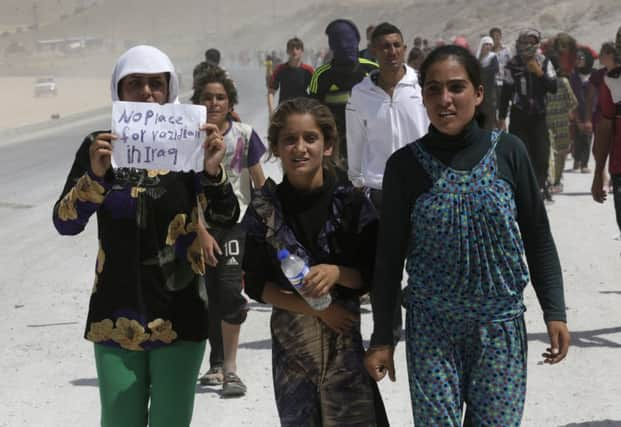Islamic State ‘a clear threat to UK’ says Cameron


Body armour and counter-explosive equipment are among hi-tech items being considered for a shipment of military hardware to be sent to Iraq to bolster out-gunned anti-IS forces.
“True security will only be achieved if we use all our resources – aid, diplomacy, our military prowess – to help bring about a more stable world,” he wrote in a Sunday newspaper.
Advertisement
Hide AdAdvertisement
Hide AdMr Cameron said it was “hardly surprising” voters were wary of any re-engagement in the country, more than a decade after the US-led invasion which ended in the present chaos. But while it was right not to “send armies to fight or occupy”, the threat posed by the Islamists was so great that some military intervention was fully justified. If IS succeeded in creating a wide-ranging caliphate encompassing several countries across the region “we would be facing a terrorist state on the shores of the Mediterranean and bordering a Nato member”.
He wrote: “This is a clear danger to Europe and to our security. It is a daunting challenge.
“But it is not an invincible one, as long as we are now ready and able to summon up the political will to defend our own values and way of life with the same determination, courage and tenacity as we have faced danger before in our history.”
The threat was underlined by reports of a fresh massacre of members of the Yazidi religious minority at the hands of jihadists despite US airstrikes against militant positions. Officials said 80 men were killed, their wives and children abducted. US warplanes are also involved in a push by Kurdish forces to retake the Mosul dam.
The UK has deployed an RAF Rivet Joint spy plane to the skies above northern Iraq, as well as Tornado aircraft to monitor the situation as part of the international humanitarian mission. Chinook copters are on standby in Cyprus for possible deployment and Britain has delivered weapons supplied by several Eastern European countries.
EU foreign ministers gave their joint approval on Saturday to the supply of arms to the Kurds and the UK is now working on the details of what they require. Mr Cameron said he would appoint a special representative to the Kurdistan Regional Government to help co-ordinate the growing assistance.
A United Nations Security Council resolution aimed at disrupting the terrorists’ flow of finance and recruits – adopted unanimously – was part of a “broader political, diplomatic and security response”.
Mr Cameron also hit out at IS supporters at home – warning that anyone “walking around with Isis flags or trying to recruit people to their terrorist cause” would be arrested.
Advertisement
Hide AdAdvertisement
Hide Ad“We are a tolerant people, but no tolerance should allow the room for this sort of poisonous extremism in our country,” he said after talks with Metropolitan Police Commissioner Sir Bernard Hogan-Howe.
Almost 50 IS-related videos were among 28,000 pieces of terrorist-related material taken down from the internet, he added. Mr Cameron said he hoped for a “new start” in Iraqi politics as newly appointed prime minister Haider al-Abadi seeks to form an inclusive administration that will unite behind opposition to IS.
Labour MP Ann Clwyd, who was appointed special envoy on human rights in Iraq by then prime minister Tony Blair in 2003, said it was inevitable the UK would have to commit ground troops to the operation to halt IS.
“There’s no point pussyfooting around when the threat is immediate,” she said, renewing calls for MPs to be recalled to Westminster to discuss the intervention.
Labour said criticisms by the Church of England – in a letter to the PM from the Bishop of Leeds – meant Mr Cameron had “serious questions” to answer”.